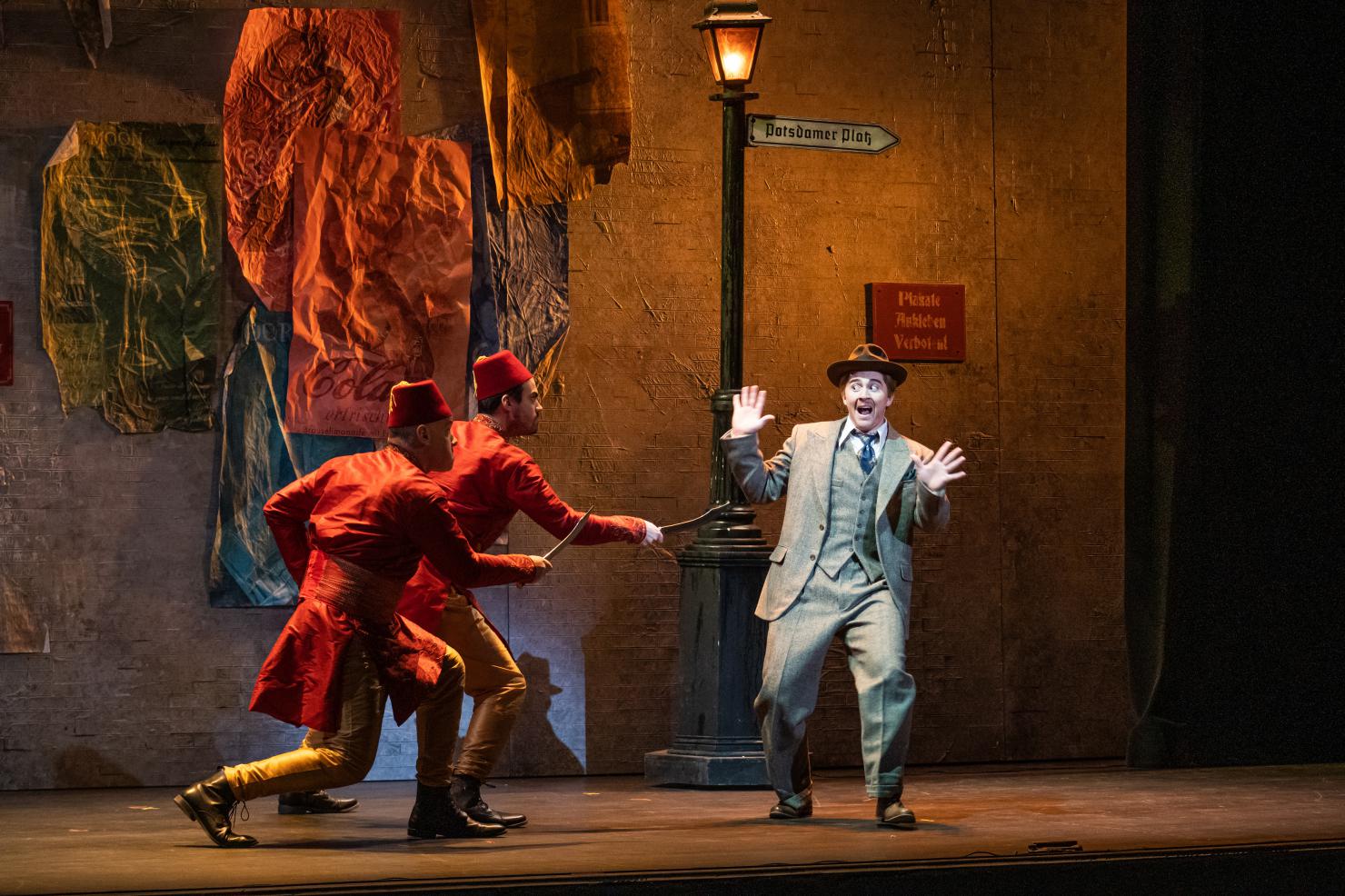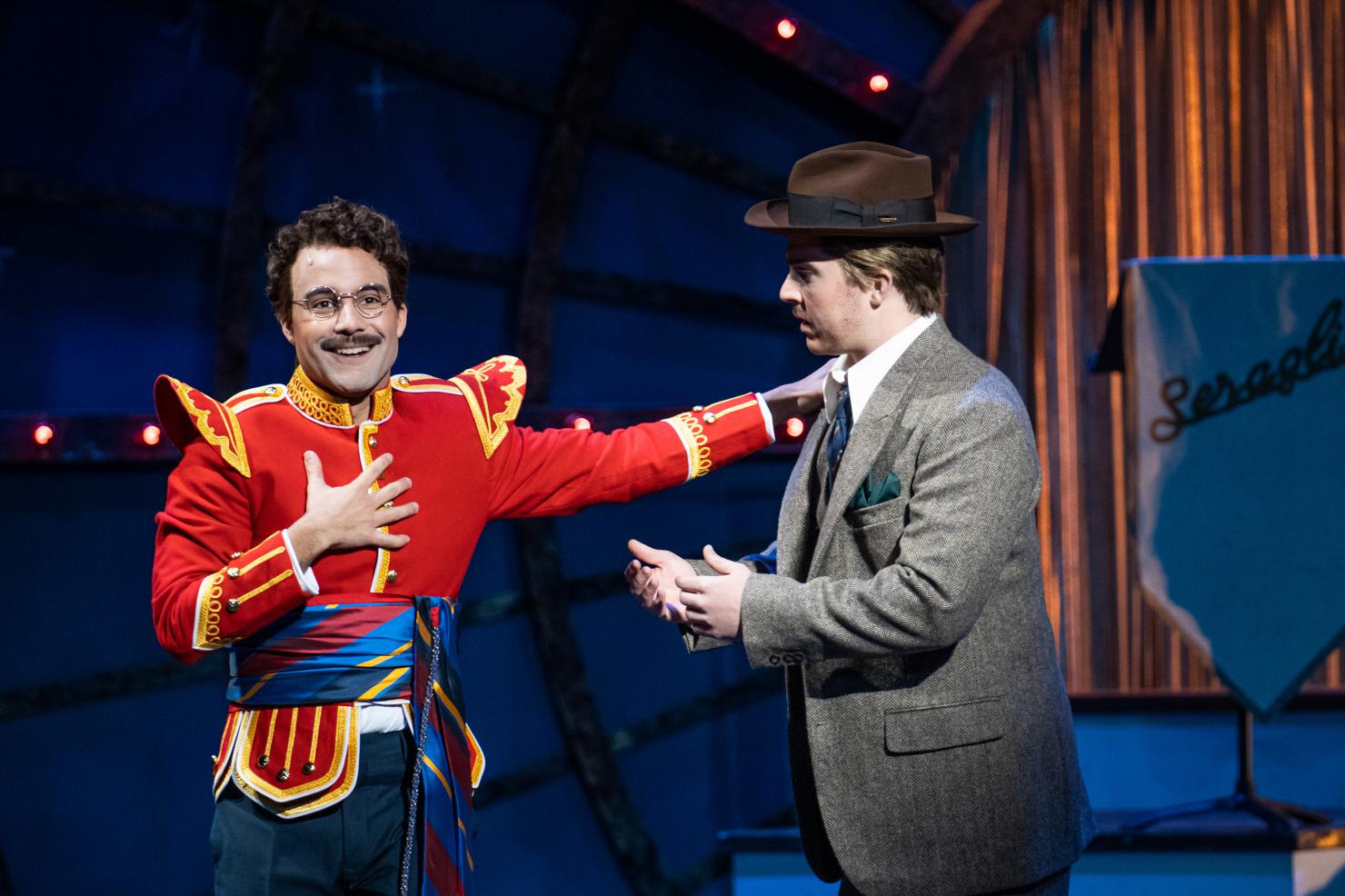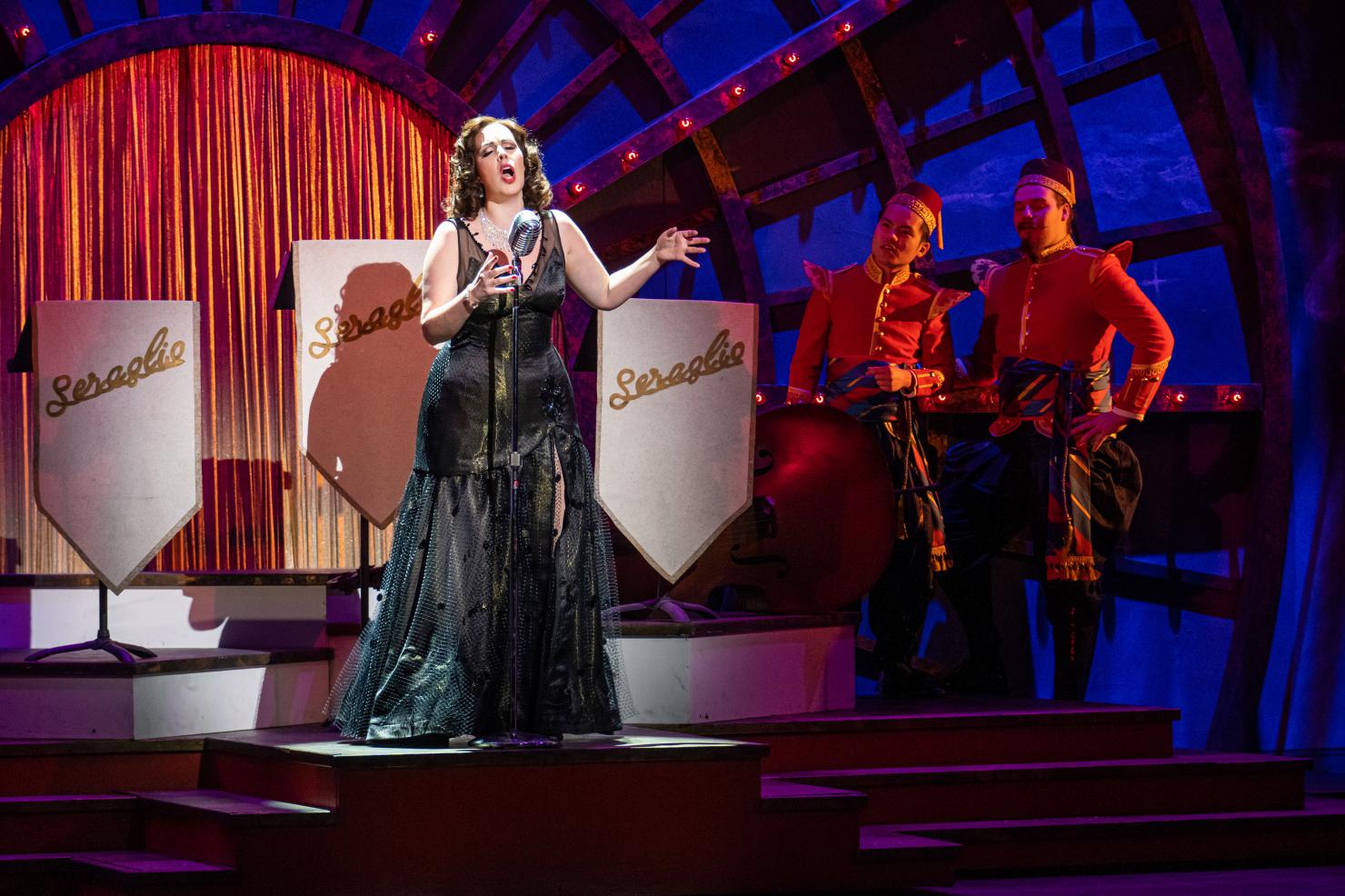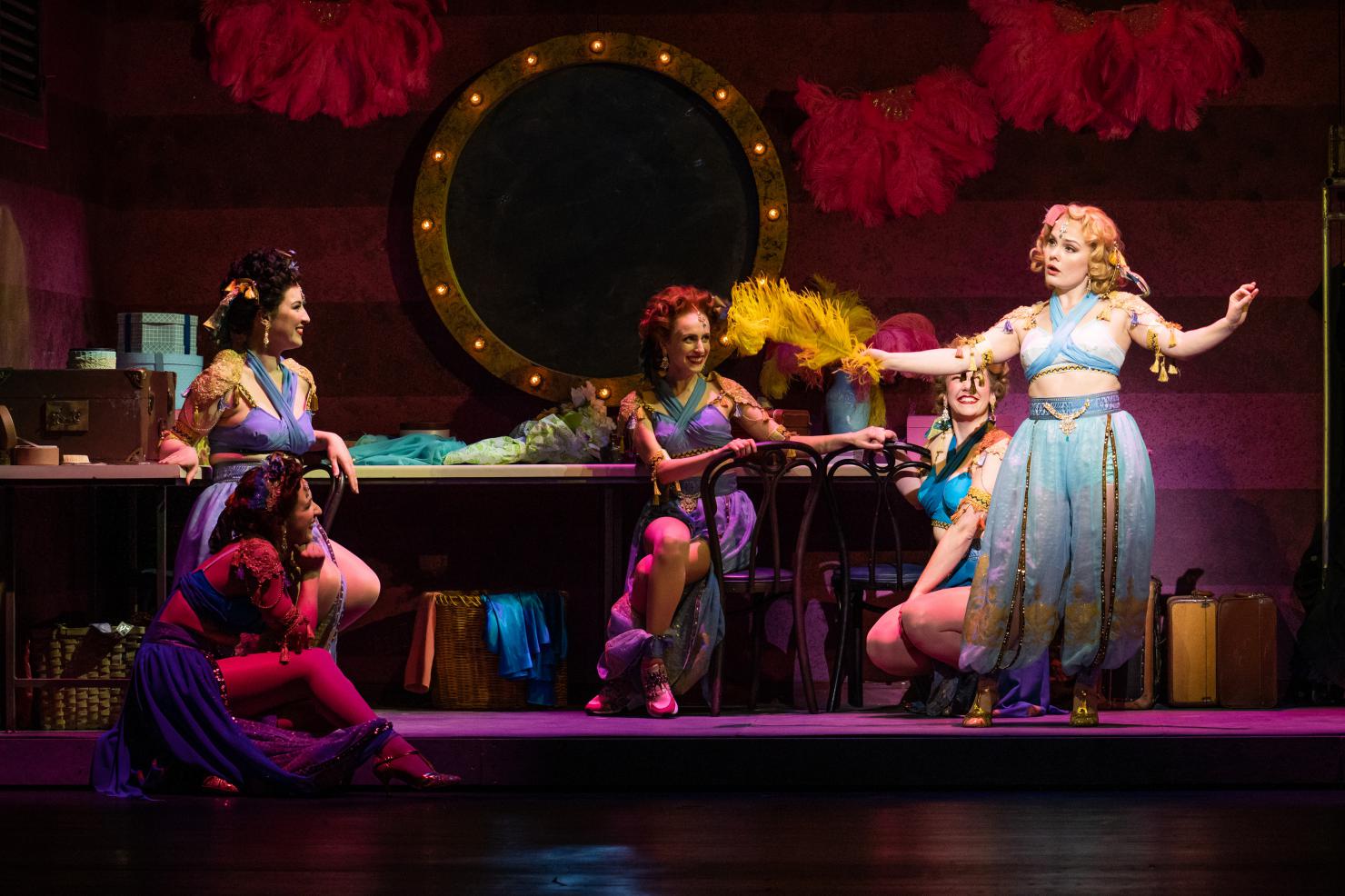
Virtuosic vocals reign supreme in Opera Omaha's Abduction
ReviewOpera Omaha’s production of The Abduction from the Seraglio brings vintage nightclub glam to Mozart’s beloved comedic Singspiel. The audience gets to enjoy the playful plot without all the dated humor and Turkish stereotypes that came with the original opera setting, a choice that allowed the virtuosic vocals to reign supreme.
Rather than 16th-century Turkey, this production took place in 1930s Germany. Scenic designer Steven Kemp contrasted the grim exterior of Pasha’s kitchy Turkish-themed nightclub with pink neon and enticing advertisements. Inside the swank establishment was luxurious and colorful, an exotic oasis from the outside world. The rotating set allowed the audience to see backstage into the dressing rooms as well as the glitzy showfloor. Costume designer Neil Fortin explored both traditional European formal wear and Middle Eastern inspired costumes. Showgirls danced around in flowy turquoise, surrounded by stern men in tuxedos and military uniforms. Alison Moritz’s stage direction featured flirty choreography, slapstick humor, and realistic human interaction. The overall effect was a fantasy world with dark undertones. Pleasure always has a price.

The orchestra brought playful exuberance to Mozart’s score under the direction of Gary Thor Wedow. As soon as the overture began, the joyful effect on the audience was immediate. This theater can have some balance issues at times, but the orchestra and singers shared the spotlight perfectly in this performance. Some of the tempos were a bit on the slow side for my taste, particularly in the more comedic numbers, but this issue seemed to work itself out by the second half.
Erik Anstine was an audience favorite in the role of Osmin. The bass brought a blustery bravado to the character that made him a believable villain but still likable. His threats of violence lost some of their power in this nightclub adaptation however, since he appeared to have very little authority as a beleaguered security manager. Anstine was comedic gold during his scenes, especially when he had his cronies to act as back up dancers.

Michael Kuhn claimed the majority of the laughter of the evening as Pedrillo. He thwarted Osmin and flirted his way through the opera with infectious energy. This role is often underrated vocally, but Kuhn’s performance demonstrated just how amazing Pedrillo’s arias can be in the hands of a great singer. Pedrillo might seem like just a smarmy sidekick on the surface, but Mozart gave him some beautiful and challenging music that often goes unappreciated. Let’s show Pedrillo more love, people!
Ashley Emerson was an equally formidable comedian and vocalist as Pedrillo’s love interest, Blonde. The soprano was the personification of spunky spitfire as soon as she came onstage, but don’t let the cute exterior fool you. Blonde went toe to toe with Osmin on numerous occasions, sending the domineering bass running for cover every time. Emerson’s bright vocal tone could come across as both bubbly and fierce, and her coloratura was effervescent. Blonde and Pedrillo together were so adorable I couldn’t handle it, a realistic romantic duo to balance out their more melodramatic companions.
Jack Swanson was everything I’ve ever wanted in a Mozartian tenor in the role of Belmonte. His heroic tone was ideal for the pining lover on a rescue mission, and his coloratura was smooth as silk. Mozart’s music can be notoriously tricky for tenors, but Swanson’s voice was made for this role. He also brought just the right touch of humor to Belmonte, a character that can sometimes come across as a bit boring. His physical comedy was at its best when paired up with Pedrillo, and his love duets with Konstanze showcased all the tenderness and passion that the audience desired.

Amanda Woodbury vocally dominated the stage in the role of Konstanze. This soprano doled out aria after aria with such virtuosity and stamina that it felt like she could have kept going all night. Konstanze is a character that can seem a bit sorry for herself all the time, but Woodbury made her anguish absolutely appealing. Some of her extremely fast coloratura lacked the rich fullness of her usual tone, but this woman sang so many notes with amazing accuracy that I didn’t care. Woodbury delivered a phenomenal performance of the famous “Martern aller Arten” aria that left the audience in awe. She brought a fierce fortitude to Konstanze that made her both sympathetic and formidable, and in combination with Swanson as Belmonte, they were a power couple onstage.
Some of the best moments of the opera occurred when all four main characters were together, and their quartet in the second act was heaven to my ears. This opera has a ton of arias, but the ensemble scenes were just as vocally challenging and compelling. It cannot be denied that Opera Omaha assembled a stellar cast for this production.
The final member of the main cast was Dieter Riesle in the spoken role of Pasha Selim. This character had a seedy underworld vibe as the mysterious nightclub owner, and Riesle gave off big dick energy that was intimidating and calm. His scenes with Konstanze gave me the creeps, especially when he casually mentions that he could take her by force. Gee, I wonder why she hasn’t fallen in love with you, Pasha? Maybe threatening to rape her isn’t a great seduction tactic.

The ending of this opera has always felt contrived to me. There’s such a dramatic build up to their failed rescue mission, and then the Pasha just lets them go. The happy resolution came as a surprise to the audience that was unfamiliar with the story, and a woman sitting near me actually gasped out “WHAT?!” when the Pasha forgave them. No matter how many times I’ve seen this opera it always feels like the librettist got tired of writing and was like, “Okay, let’s just wrap this up real quick.” Still despite the miraculous twist, I left the theater satisfied by the heavy dose of Mozart magic in the form of virtuosic singing.
I am the kind of person that will adore a Mozart opera in almost any setting, but Opera Omaha’s re-imagined 1930s nightclub version of The Abduction from the Seraglio actually improved some of the original’s problematic dated elements. The essential emotions remained the same, and the music soared to new heights in the hands of a cast of skilled vocal technicians. If you’re seeking beautiful music, romance, and comedy, then look no further.


Comments